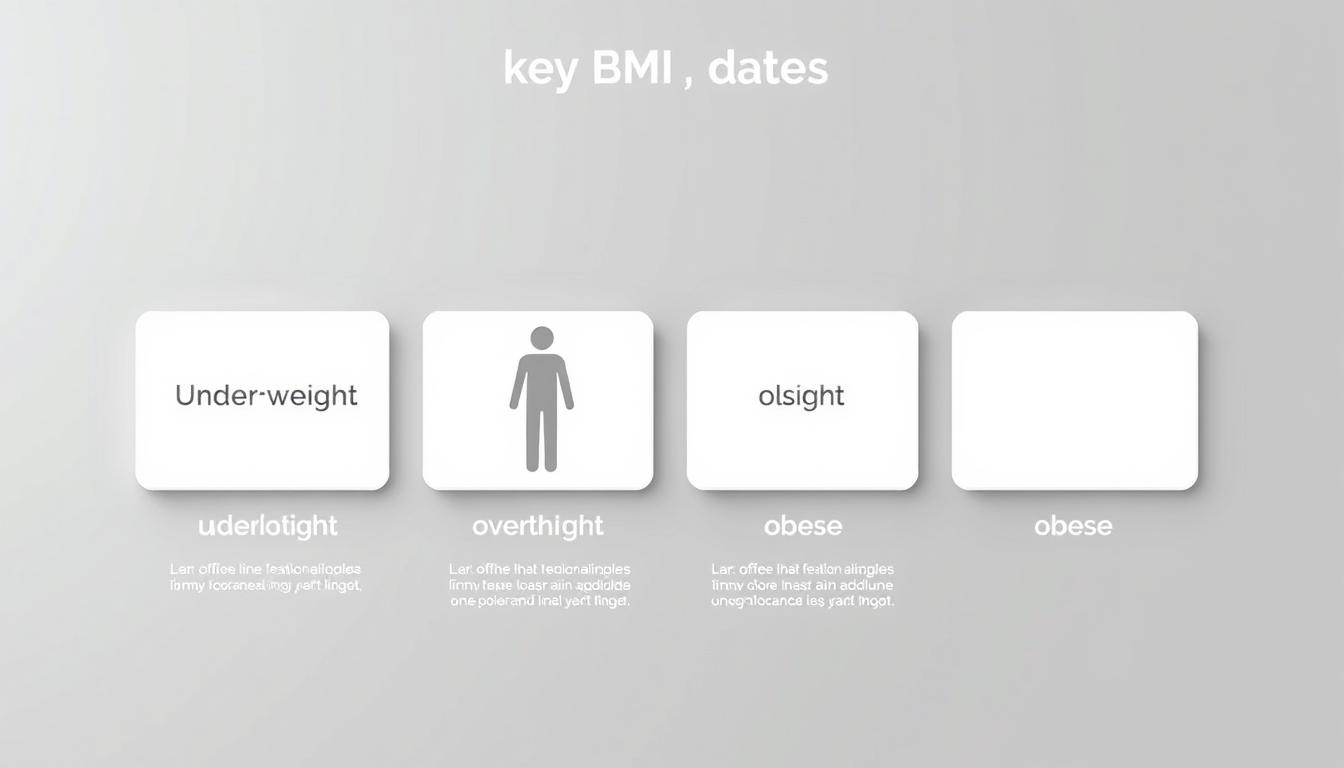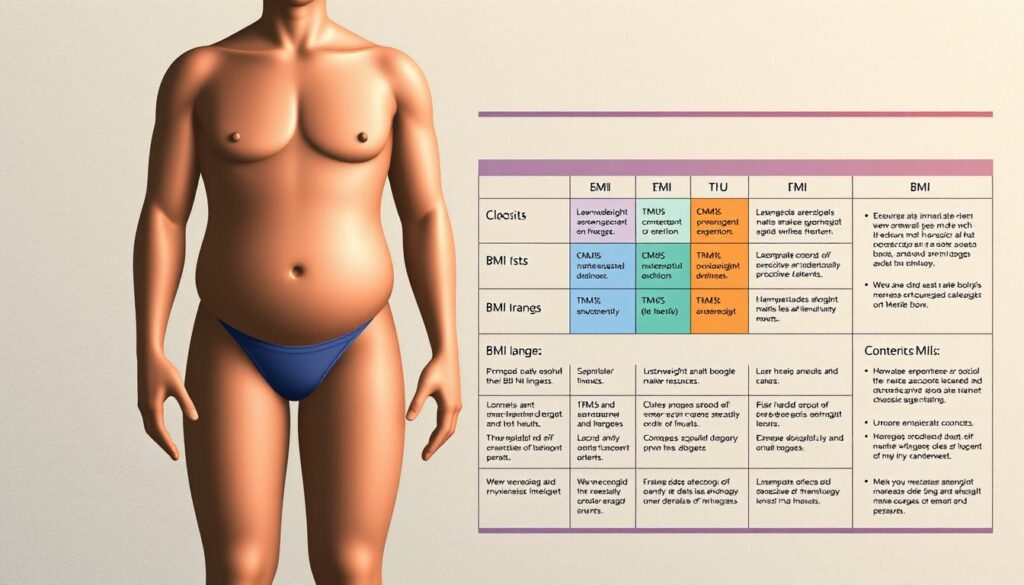Are you wondering if achieving a healthy Body Mass Index (BMI) is within reach? With more than one-third of American adults classified as obese, the need to reduce BMI is clear.
High BMI is linked to serious health issues like diabetes, heart disease, and some cancers. Lowering BMI naturally through diet, exercise, and lifestyle changes can greatly reduce these risks. It also improves your overall health and well-being.
Knowing the different BMI categories is the first step to a healthier life. These categories range from underweight to obese, each with its own health implications.
Key Takeaways
- Lowering BMI can reduce the risk of chronic diseases.
- Natural methods such as diet and exercise are effective.
- Understanding BMI categories is crucial for health.
- Lifestyle changes can significantly impact BMI.
- Achieving a healthy BMI improves overall well-being.
Understanding BMI and Its Importance
Knowing our Body Mass Index (BMI) is key to a healthy life. BMI is a simple way to check if our weight is right for our height.
What is BMI?
BMI is found by dividing our weight in kilograms by our height in meters squared. It shows if we are underweight, overweight, or at a healthy weight. The American Heart Association says BMI helps spot health risks linked to weight.
BMI Calculation: BMI = weight (kg) / height (m)2
How BMI Affects Our Health
Our BMI greatly affects our health. Being underweight, overweight, or obese raises the risk of health problems. For example, a high BMI increases the risk of heart disease, diabetes, and certain cancers. Being underweight can cause osteoporosis and weakened immunity.
“Maintaining a healthy weight is a critical aspect of overall health and wellbeing.”
Ideal BMI Ranges
The World Health Organization sets BMI categories:
- Underweight: BMI
- Normal weight: BMI = 18.5-24.9
- Overweight: BMI = 25-29.9
- Obese: BMI ≥ 30
| BMI Category | BMI Range | Health Risks |
|---|---|---|
| Underweight | Less than 18.5 | Osteoporosis, weakened immunity |
| Normal weight | 18.5-24.9 | Low risk |
| Overweight | 25-29.9 | Increased risk of heart disease, diabetes |
| Obese | 30 or greater | High risk of heart disease, diabetes, certain cancers |
Understanding our BMI and its health effects is the first step to a healthier life. By knowing our BMI, we can take steps to lower it and stay healthy.
Diet Strategies to Lower BMI
A well-planned diet is key to lowering BMI. We must choose diet strategies that help us lose weight and stay healthy.
Importance of a Balanced Diet
Eating a balanced diet is crucial for health and a healthy BMI. It means eating foods low in bad fats, sugars, and salt. Instead, focus on fruits, veggies, and whole grains. Foods rich in fiber and protein are great for feeling full and helping with weight loss.
It’s not just about cutting out bad foods. It’s also about adding lots of nutrient-rich foods. For example, eating more fiber from fruits, veggies, and whole grains can help with weight control.
Foods That Promote Weight Loss
Some foods are better for weight loss because of their nutrients. Leafy greens, nuts, and seeds are top picks because they’re full of good stuff and low in calories. Also, foods with lots of protein like lean meats, fish, and legumes help build muscle, aiding in weight loss.
Don’t forget to include healthy fats in your diet. Avocados, olive oil, and fatty fish are good sources. They give us important nutrients and keep us feeling full, so we don’t overeat.
Meal Portion Control
Controlling how much we eat is vital for managing weight and lowering BMI. It means paying attention to how much we eat at each meal to avoid eating too much. Using smaller plates and measuring food can help control how much we eat.
Knowing the calories in our food is also important. Reading labels and choosing foods with fewer calories can help us lose weight. By making smart food choices, we can control our calorie intake and reach our weight loss goals.
Exercise and Physical Activity
Making physical activity a part of our daily life is key to a healthier BMI. Exercise not only burns calories but also builds muscle, boosting our metabolism. The NHS suggests at least 150 minutes of moderate-intensity aerobic activity or 75 minutes of vigorous-intensity aerobic activity each week.
Benefits of Regular Exercise
Regular physical activity offers many benefits. It improves our heart health, lifts our mood, and boosts our energy. It also helps improve BMI naturally by burning calories and building muscle.
Regular exercise also lowers the risk of chronic diseases like heart disease and diabetes. These diseases are often linked to higher BMI levels.
Types of Exercises to Incorporate
A good exercise routine should include cardio, strength training, and flexibility exercises. Cardio activities like running, cycling, or swimming burn calories. Strength training, through weightlifting or bodyweight exercises, builds muscle.
For those looking to naturally lower BMI, mixing up exercises keeps the routine interesting and prevents plateaus.
Creating a Workout Routine
To make an effective workout routine, start by setting realistic goals and choosing activities you enjoy. It’s important to vary your routine to avoid boredom and prevent injuries.
For example, alternate between cardio and strength training days. Remember to include rest days for muscle recovery. This way, we can keep a consistent routine that supports our goal of improving BMI naturally.
Lifestyle Changes for Weight Management
There’s more to managing weight than just diet and exercise. Lifestyle changes can greatly impact our health and wellbeing.
Importance of Sleep
Getting enough sleep is key for weight control. Lack of sleep can mess with hunger hormones, making us eat more. Aim for 7-9 hours of sleep per night to help manage these hormones and aid in weight loss.
To improve sleep, stick to a routine, relax before bed, and avoid caffeine and screens at night.
Stress Management Techniques
Too much stress can make cortisol levels go up, leading to belly fat. Engaging in stress-reducing activities like meditation, yoga, or deep breathing can help keep stress levels down.
Other ways to manage stress include:
- Meditation and mindfulness practices
- Regular physical activity
- Journaling or expressive writing
Staying Hydrated
Drinking enough water is vital for health and can help with weight management. Sometimes, we think we’re hungry when we’re really thirsty, leading to extra calories.
| Hydration Tips | Benefits |
|---|---|
| Drink at least 8 cups (64 oz) of water per day | Helps control hunger and boost metabolism |
| Avoid sugary drinks | Reduces calorie intake |
| Monitor urine output | Ensures proper hydration |
Monitoring Progress and Staying Motivated
To lower BMI naturally, tracking progress and staying motivated are key. By regularly checking our BMI, we can spot patterns. This helps us adjust our diet and exercise plan.
Tracking BMI Changes
Using a BMI calculator or tracking our weight loss can keep us on track. Studies show that tracking food intake helps in losing and keeping off weight. For more tips on staying motivated, check out this link.
Setting Achievable Goals
Setting realistic goals is crucial for success. Aim to lose 1-2 pounds a week for sustainable weight loss. It’s also important to monitor how we feel and function in healthy weight management.
Celebrating small wins can boost our morale. Reaching a new exercise best or losing weight are great achievements. Acknowledging these helps us stay motivated on our BMI journey.




